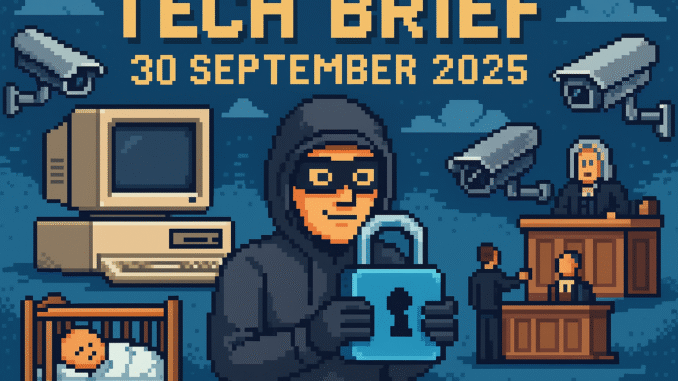
Curious how hackers, political rows, and a letter written in 1941 all shape today’s digital world? Tech Brief 30 September 2025 rounds up new threats to privacy, headline lawsuits, and a tech history moment that may have quietly sparked the computers under our fingers. Missed yesterday’s Tech Brief? Catch up here before diving in.
Hackers Threaten Kido Nursery After Data Breach
“Radiant,” a group of cybercriminals, claims to have hacked the UK nursery chain Kido, releasing ten children’s profiles and threatening to publish details on thirty more children, plus 100 employees, unless their extortion demands are met. The gang has published a “data leakage roadmap” on the dark web, outlining how much data they will reveal and when.
You might be used to stories about malware on PCs, but leaking sensitive records about toddlers is a brutal escalation. In the past, digital criminals targeted credit card numbers. Now, they threaten the youngest members of society, with their parents caught in the crossfire. Older security guides warned users about weak passwords and floppy disk viruses. Today’s threat landscape is far more personal and frightening.
If the words “data roadmap” never appeared in our childhood computer clubs, we’re in good company. This is not the threat model any of us grew up with.
Police Rules Overhauled for Facial Recognition Cameras
What happens when the British government wants more surveillance, but everyone else worries about privacy? The Home Office, led by Policing Minister Sarah Jones, is pushing a consultation on facial recognition technology rules for police.
Historically, Britain’s public watched CCTV become normal, even in chip shops. Facial recognition, though, takes surveillance several steps further. These cameras match faces in live crowds to databases, raising fears about accuracy, false positives, and privacy rights.
Some critics cite dystopian fiction or warn civil liberties are at risk. Supporters respond that digitised search tools can help police catch criminals missed by older methods. The announcement comes as cyberattacks and data breaches (see above) make everyone more sensitive to questions about who sees their data and why.
Which matters more, public order or personal privacy? The consultation promises a spirited public debate.
YouTube Settles Trump Suspension Suit for $24.5 Million
Did anyone imagine a suspended YouTube account costing nearly £20 million? Alphabet’s YouTube has agreed to pay $24.5 million (about £20 million) to settle Donald Trump’s lawsuit over his account’s suspension after the Capitol riots of January 2021.
This legal battle reopens old wounds about who “owns” the internet’s conversation. In the 90s, the argument was fought in the newsgroups, with sysop moderators and quick-witted flame wars. Now, the rules are drawn up in corporate boardrooms and decided by expensive lawyers. The stakes are higher, and the sums laughable next to what a ZX Spectrum cost when new.
There’s a genuine question here. Is the web growing up or only becoming more sanitised and less freewheeling? Some will celebrate, others will fume, and a few might start reconnecting their old web servers for the thrill.
JLR Production Restarts After Cyberattack and £1.5 Billion Bailout
We all remember when production halts meant strikes, not ransomware. Jaguar Land Rover, pride of British roads, has restarted its lines after weeks of downtime caused by a cyberattack. The company secured a government loan guarantee of £1.5 billion for recovery. Car production, interrupted by hackers, resumes under new questions: can classic British manufacturing survive digital sabotage?
A few decades ago, resilience meant spare parts and skilled fitters. Now, critical infrastructure depends on software patches as much as steel and oil. Insurance firms and policymakers are debating who should absorb the next attack: the state, the company, or the hackers’ crypto wallets?
As with the Kido nursery breach above, resilience is not just about being old or new but about trust in digital systems, from car plants to classroom registers. Is the modern British industry more exposed than the one we rebuilt after the 1980s?
From the Wayback Machine
On This Day: 1941 – Mauchly Writes to Atanasoff
On 30 September 1941, physicist John Mauchly sent engineer John Atanasoff a letter about collaboration in electronic computing. Their correspondence connected the Pennsylvania Moore School and Iowa State College, quietly setting off a chain reaction that led to the first modern computers.
Mauchly’s visit to Atanasoff’s lab, and this exchange, helped steer wartime science away from mechanical calculators. The Atanasoff and Berry Computer used vacuum tubes to process calculations in binary, though its memory system was based on rotating drums and capacitors rather than regenerative memory. That leap, along with the team’s ideas, would feed into iconic projects like the ENIAC. Patent battles followed and filled courts for decades, but these simple letters and ideas outlived the quarrels, laying down the groundwork for digital standards we use, often unknowingly, every day.
Today’s Big Question
Are giant court cases, government bailouts, and parent-facing cybercriminals proof that our connected world is more vulnerable than anyone ever expected? Tech Brief 30 September 2025 asks: have we finally reached the point where digital lives need more than clever kit and passwords for protection?
Keep your logs clean and your nostalgia close, especially when even nursery schools aren’t safe from digital trouble.
Missed yesterday’s Tech Brief? Catch up here

Leave a Reply